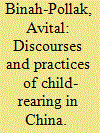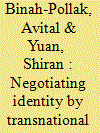| Srl | Item |
| 1 |
ID:
129802


|
|
|
|
|
| Publication |
2014.
|
| Summary/Abstract |
Based on 13 months of fieldwork which was conducted among middle-class families in Beijing, this article explores young children's daily bodily practices and juxtaposes these practices with discourses on child-rearing which have gained prominence in post-Mao China. The article aims to demonstrate that the new discourse on childhood, education, and child-rearing, which has been promoted by the Chinese government since the 1980s, does not always correspond to, and sometimes even contradicts, actual practices in Chinese families. The argument here is that this gap stems in large part from the dominant role of grandparents during the early stages of child-rearing, who tend to perpetuate values and practices, such as obedience and dependence, and to maintain a firm grip on the child's body.
|
|
|
|
|
|
|
|
|
|
|
|
|
|
|
|
| 2 |
ID:
186849


|
|
|
|
|
| Summary/Abstract |
For some years now, there has been an increase in the number of Chinese students travelling abroad to pursue higher education. The outbreak of COVID-19 has created new challenges for international students around the world. Based on an analysis of online forums during the pandemic (January–July 2020), we focus on the challenges Chinese transnational students have been facing. From the state's point of view, being at the front of China's internationalization progress, the students are expected to have both a ‘vision of globalization’ (国际化视野) as well as a deep ‘Chinese feeling’ (中国情怀). However, in practice during the pandemic, the students found it extremely difficult to achieve a balance between their multiple identities. In this article, we argue that discrepancies between the students’ identities may be due to the pandemic having highlighted several existing conflicts that have so far received only meagre attention or were even overlooked.
|
|
|
|
|
|
|
|
|
|
|
|
|
|
|
|